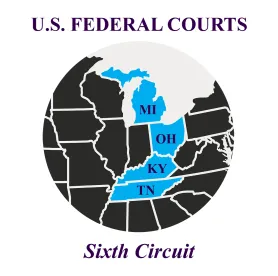The Czar first broke the bad news hot off the press earlier today: the much-anticipated Lindenbaum v. Realgy, LLC appeal ended in a dud. Yep, the Sixth Circuit just put a nail in the Creasy coffin and chipped away at free speech in the process.
First the good news: the court confirmed that the contentious footnote 12 of the AAPC decision—in which three Justices mused that AAPC “does not negate the liability of parties who made robocalls covered by the robocall restriction”—was dicta and was not binding. Yay? It’s all downhill from there.
After addressing a procedural nuance, the court dove right into the severability analysis, finding that the Supreme Court’s severance of the unconstitutional government-debt exception applied retroactively to save the previously unconstitutional statute. In this analysis, the Sixth Circuit emphasized that “[c]ourts do not change statutes.” But they do “say what the law is” and “disregard[] unconstitutional” parts of statutes. So they don’t change statutes, but they ignore parts of statutes that they deem unconstitutional. Okay…
The court tries to reconcile this by saying that unconstitutional statutes are never really law, so the court is just “interpreting what, if anything, the statute has meant from the start in the absence of the always-impermissible provision.”
So, the Sixth Circuit essentially held that AAPC’s severance applies retroactively because the Supreme Court wasn’t actually severing anything; it was just interpreting what the law always was (minus the provision the court just deemed unconstitutional).
This all feels a little circular to me. And there are a whole bunch of problems with this, in my opinion—among others, under this decision, it seems that judicial severance will always be retroactive, but that’s simply not true under Supreme Court precedent.
The second part of the decision fares no better and will most definitely get the Czar on his First Amendment soapbox in no time. The decision dedicates two paragraphs to the First Amendment analysis, and essentially sidesteps the issue. The court stated that whether government-debt collectors lacked fair notice of their actions’ unlawfulness wasn’t at issue in the case, and then goes on to say (in dicta) that there’s no First Amendment “problem” even if they weren’t.
This, in my opinion, ignores the real First Amendment implications of the court’s ruling, which the ACLU aptly summarized in its amicus brief. One of Realgy’s lawyers (Ryan Watstein of Kabat Chapman & Ozmer) reached out to TCPAWorld about this and had some stark words:
[T]he Court’s ruling is a significant blow to free speech, as it endorses the creation of discriminatory speech regimes by federal and state governments without consequence. For example, under the Court’s ruling, Congress could enact an exception to the TCPA for a particular political party (or race), and the statute could be enforced against the disfavored party up until the Supreme Court severed the exception. At the same time, the favored party couldn’t be prosecuted because they lacked fair notice that their conduct was prohibited (because they relied on an exception). This is the exact content discrimination that the majority in AAPC said violates the First Amendment, and it is unthinkable that such a regime could exist in the United States.
The panel, Watstein stated, “didn’t even attempt to grapple with this.”
I sense a cert. petition in our future. So is Creasy dead? It’s not looking good, but I’m still holding out hope for a Kill Bill-esque escape from the coffin.




 />i
/>i

